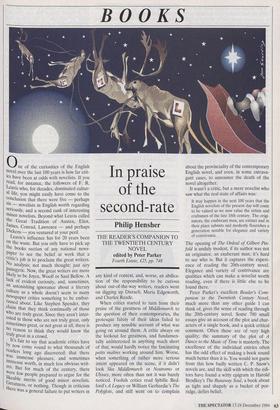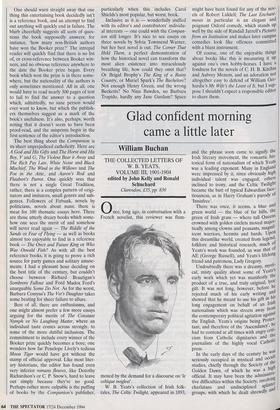BOOKS
In praise of the second-rate
Philip Hensher
THE READER'S COMPANION TO THE TWENTIETH CENTURY NOVEL edited by Peter Parker Fourth Estate, £25, pp. 748 One of the curiosities of the English novel over the last 100 years is how far crit- ics have been at odds with novelists. If you read, for instance, the followers of F. R. Leavis who, for decades, dominated cultur- al life, you might easily have come to the conclusion that there were five — perhaps six — novelists in English worth regarding seriously, and a second rank of interesting minor novelists. Beyond what Leavis called the Great Tradition of Austen, Eliot, James, Conrad, Lawrence — and perhaps Dickens — you ventured at your peril. Leavis's influence has for 20 years been on the wane. But you only have to pick up the books section of any national news- paper to see the belief at work that a critic's job is to proclaim the great writers. No analysis; not much thought; just airy Panegyric. Now, the great writers are more likely to be Joyce, Woolf or Saul Bellow. A lack of evident curiosity, and, sometimes, an astonishing ignorance about a literary culture as a whole doesn't seem to many newspaper critics something to be embar- rassed about. Like Stephen Spender, they claim that they think continually of those Who are truly great. Since they aren't inter- ested in those who are not truly great, only sometimes great, or not great at all, there is no reason to think they would know the truly great in a crowd.
It's fair to say that academic critics have by now come round to what thousands of readers long ago discovered; that there was immense pleasure, and sometimes immense worth, in much less obvious writ- ers. But for much of the century, there were few people prepared to argue for the likeable merits of good minor novelists. Greatness, or nothing. Though in criticism there was a general failure to put writers in any kind of context, and, worse, an abdica- tion of the responsibility to be curious about out-of-the-way writers, readers went on digging up Disraeli, Maria Edgeworth, and Charles Reade.
When critics started to turn from their praise of the greatness of Middlemarch to the question of their contemporaries, the grotesque falsity of their ideas failed to produce any sensible account of what was going on around them. A critic always on the lookout for greatness, and fundamen- tally uninterested in anything much short of that, would hardly notice the fascinating petits maitres working around him. Worse, when something of rather more serious intent appeared on the scene, if it didn't look like Middlemarch or Nostromo or Ulysses, more often than not it was barely noticed. Foolish critics read Sybille Bed- ford's A Legacy or William Gerhardie's The Polyglots, and still went on to complain about the provinciality of the contemporary English novel, and even, in some extrava- gant cases, to announce the death of the novel altogether.
It wasn't a critic, but a mere novelist who saw what the real state of affairs was:
It may happen in the next 100 years that the English novelists of the present day will come to he valued as we now value the artists and craftsmen of the late 18th century. The origi- nators, the exuberant men, are extinct and in their place subsists and modestly flourishes a generation notable for elegance and variety of contrivance.
The opening of The Ordeal of Gilbert Pin- fold is unduly modest; if its author was not an originator, an exuberant man, it's hard to see who is. But it captures the experi- ence of reading the 20th-century novel. Elegance and variety of contrivance are qualities which can make a novelist worth reading, even if there is little else to be found there.
Peter Parker's excellent Reader's Com- panion to the Twentieth Century Novel, much more than any other guide I can think of, gives the sense of reading through the 20th-century novel. Some 700 small essays give an account of the plot and char- acters of a single book, and a quick critical comment. Often these are of very high quality; the summary of the plot of A Dance to the Music of Time is masterly. The excellence of the individual entries often has the odd effect of making a book sound much better than it is. You would not guess from this how badly written C. P. Snow's novels are, and the skill with which the edi- tors have found a witty epigram in Harold Brodkey's The Runaway Soul, a book about as tight and shapely as a bucket of por- ridge, defies belief. One should warn straight away that one thing this entertaining book decidedly isn't is a reference book, and an attempt to find out anything will quickly end in failure. The blurb cheerfully suggests all sorts of ques- tions the book supposedly answers; for instance, 'how many non-British authors have won the Booker prize?' The intrepid reader will quickly find that there is no list of, or cross-reference between Booker win- ners, and no obvious reference anywhere to the date the Booker prize began. Every book which won the prize is in there some- where, but the nationality of the authors is only sometimes mentioned. All in all, one would have to read nearly 300 pages of text to fail to find the answer to a question which, admittedly, no sane person would ever want to know, but which the publish- ers themselves suggest as a mark of the book's usefulness. It's also, perhaps, worth noting that it doesn't seem to have been proof-read, and the misprints begin in the first sentence of the editor's introduction.
The best thing about the Companion is its sheer unprejudiced catholicity. Here are A God and His Gifts and The Horse and His Boy, V and G, The Violent Bear it Away and The Rich Pay Late, White Noise and Black Mischief, The Wind in the Willows and The Fox in the Attic, and Aaron's Rod and Flaubert's Parrot. One quickly sees that there is not a single Great Tradition, rather, there is a complex pattern of origi- nators and imitators, small genres and sub- genres. Followers of Firbank, novels by politicians, novels about nuns; there is meat for 100 thematic essays here. There are those utterly dreary books which some- how one sees the merit of and somehow will never read again — The Riddle of the Sands or Fear of Flying — as well as books almost too enjoyable to find in a reference book — The Once and Future King or Who Was Oswald Fish? As with all the best reference books, it is going to prove a rich source for party games and solitary amuse- ments. I had a pleasant hour deciding on the best title of the century, but couldn't choose between Richard Brautigan's Sombrero Fallout and Ford Madox Ford's unarguable Some Do Not. As for the worst, Barbara Comyns's The Vet's Daughter takes some beating for sheer failure to allure.
Best of all, there are enthusiasms, and one might almost prefer a few more essays arguing for the merits of The Constant Nymph or No Laughing Matter, where an individual taste comes across strongly, to some of the more dutiful inclusions. The commitment to include every winner of the Booker prize quickly becomes a bore; one wonders how far Penelope Lively's tedious Moon Tiger would have got without the stamp of official approval. Like most liter- ary historians, the editor has found even very inferior romans fleuves, like Dorothy Richardson's or C. P. Snow's, hard to leave out simply because they're no good. Perhaps rather more culpable is the puffing of books by the Companion's publisher, particularly when this includes Carol Shields's most popular, but worst, book.
Inclusive as it is — wonderfully stuffed with its editor's and contributors' individu- al interests — one could wish the Compan- ion still longer. It's nice to see essays on three novels by Sylvia Townsend Warner, but her best novel is out. The Corner That Held Them, a perfect demonstration of how the historical novel can transform the most alien existence into miraculously breathing life, how could they omit that? Or Brigid Brophy's The King of a Rainy Country, or Muriel Spark's The Bachelors? Not enough Henry Green, and the wrong Becketts? No Nina Bawden, no Barbara Trapido, hardly any Jane Gardam? Space might have been found for any of the nov- els of Robert Liddell; The Last Enchant- ments in particular is an elegant and poignant Oxford comedy, which stands UP well by the side of Randall Jarrell's Pictures from an Institution and makes later campus comedies look like offences committed with a blunt instrument.
Of course, one of the enjoyable things about books like this is measuring it up against one's own hobby-horses. I have .a fondness for the novels of C. H. B. Kitchin and Aubrey Menem, and an adoration not altogether easy to defend of William Ger- hardie's My Wife's the Least of It, but I sup- pose I shouldn't expect a responsible editor to share them.











































































































 Previous page
Previous page